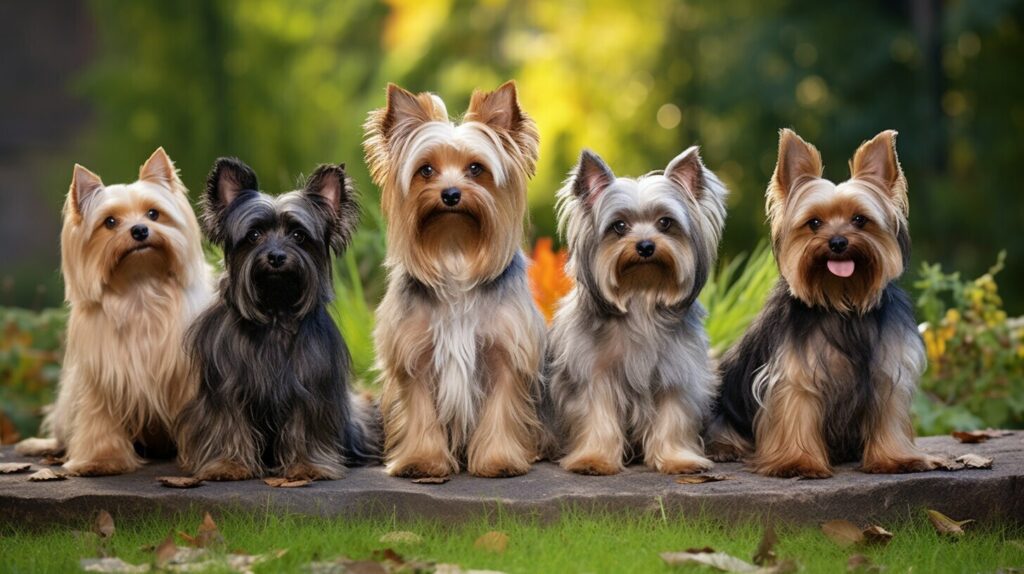If you’re looking for a furry friend to keep you company, there’s something undeniably appealing about a small dog breed. Their diminutive size, adorable appearance, and playful personalities make them ideal for apartment living or those who simply prefer a compact canine companion.
In this article, we’ll explore the world of smallest dog breeds, from miniature and toy breeds to teacup dogs. You’ll learn about their unique characteristics, exercise needs, grooming requirements, and potential health issues. We’ll also share tips on training and socialization, as well as how to choose the right small dog breed for your lifestyle and preferences.
Key Takeaways:
- Small dog breeds, including miniature, toy, and teacup dogs, are ideal for those looking for a compact canine companion.
- They have specific exercise, grooming, and health needs that potential owners should consider before adopting a small dog breed.
- Training and socialization are important for small dog breeds, and early socialization is key to ensuring a well-rounded and confident companion.
- When choosing a small dog breed, it’s important to research breed characteristics, interact with different breeds, and seek advice from reputable breeders or adoption centers.
What Defines a Small Dog Breed?
Small dogs have captured the hearts of many pet owners with their compact size and lovable personalities. But what really defines a small breed dog?
Small breed dogs, also known as pocket-sized dogs or compact dog breeds, typically weigh between 5 and 22 pounds and stand less than 16 inches tall. These tiny pups are perfect for those who live in apartments or have limited living space, but still want a furry companion.
Small dogs are also known for their long lifespans, which can range from 12 to 20 years depending on the breed. This means that owning a small breed dog is a long-term commitment that requires careful consideration.
When choosing a small dog, it’s important to take into account their unique characteristics and needs. Small dogs often have higher energy levels and require more exercise than larger breeds, but they may also be more prone to certain health issues. Additionally, some small breed dogs may have specific grooming requirements that should be considered before bringing them home.
Overall, small breed dogs make wonderful companions for those seeking a pocket-sized pet. With proper care and attention, these furry friends can bring joy and love into your life for many years to come.
Popular Miniature Dog Breeds
If you’re looking for a canine companion that won’t take up too much space, miniature dog breeds are a great option. These small breed dogs are known for their playful personalities and adorable appearance. Here are some of the most popular miniature dog breeds:
| Breed | Characteristics |
|---|---|
| Chihuahua | Known for being fiercely loyal to their owners, chihuahuas are one of the smallest dog breeds, often weighing less than 5 pounds. They have a big personality and love to snuggle up in their owner’s lap. |
| Pomeranian | These fluffy balls of energy are outgoing and playful, making them a great choice for families with kids. Pomeranians are compact, weighing between 3 and 7 pounds, and have a thick coat that requires regular grooming. |
| Yorkshire Terrier | Often called “Yorkies,” these miniature dogs are known for their confidence and brave nature. They typically weigh between 4 and 7 pounds and have a silky coat that requires regular grooming. |
| Shih Tzu | With their cute, squishy faces and luxurious coat, shih tzus are an adorable miniature dog breed. They are playful and affectionate, making them a great choice for families with children. Shih tzus typically weigh between 9 and 16 pounds. |
These miniature dog breeds are just a few examples of the many small breed dogs available. When choosing a miniature dog breed, it’s important to consider their personality, exercise needs, and grooming requirements to ensure they are a good fit for your lifestyle.
Toy Dog Breeds: Delight in Compact Packages
When it comes to small dog breeds, toy dogs are among the most popular. These pint-sized pups are known for their adorable looks and delightful personalities, making them ideal companions for those seeking a compact canine.
As their name suggests, toy dogs are small enough to fit in the palm of your hand, with most breeds weighing between four and fifteen pounds. These tiny dogs are often ideal for those living in small spaces, such as apartments, where larger breeds may not be practical.
Toy dogs come in a variety of breeds, with each one having its own unique characteristics. Some of the most popular toy dog breeds include the Chihuahua, Pomeranian, and Shih Tzu. These compact canines are known for their playful energy, making them perfect for families looking for a fun-loving pet.
Despite their small size, toy dogs still require regular exercise to maintain their health and wellbeing. Taking your pup for a daily walk or engaging in indoor playtime can help keep them happy and healthy. Additionally, toy dogs often require frequent grooming to keep their coats looking their best.
Overall, toy dog breeds are an excellent choice for those looking for a compact canine companion. Their adorable appearance, playful personalities, and suitability for small living spaces make them a popular choice among dog lovers.
Teacup Dog Breeds: Tinier Canines with Unique Appeal
If you’re looking for a small dog breed that’s even tinier than the typical miniature dog breeds, teacup dog breeds may be the perfect match for you. These pocket-sized pups are often smaller than their miniature counterparts and have gained popularity among dog enthusiasts for their unique appeal. However, before considering a teacup dog breed, there are several important factors to keep in mind.
One key consideration is the potential health issues that can arise with such a small dog. Teacup dog breeds are often prone to health problems due to their extremely small size, such as dental issues, hypoglycemia, and respiratory problems. Therefore, it’s essential to provide proper care and attention to ensure they stay healthy and happy.
Teacup dog breeds also have specific care requirements, such as regular feeding throughout the day to maintain their blood sugar levels. They may also need to wear clothing in cold weather to prevent hypothermia, and their toys and accessories should be appropriately sized for their tiny frames.
Despite their small size, teacup dog breeds may still have energetic personalities and require daily exercise to stay happy and healthy. Due to their size, exercise requirements can often be met indoors, making them great tiny dog breeds for apartments or small living spaces.
Teacup dog breeds are not recognized by major dog organizations such as the American Kennel Club, and there is debate about whether they are a separate breed or just a variation of a miniature breed. However, there are many different teacup dog breeds available, ranging from teacup Chihuahuas to teacup Pomeranians, each with their unique characteristics and personalities.
If you’re considering a teacup dog breed, it’s crucial to do your research and seek advice from reputable breeders or adoption centers. Additionally, make sure you have the time, resources, and patience to provide proper care and attention to your teacup companion.
Considerations for Owning a Smallest Dog Breed
If you’re considering adopting a small dog breed, there are several important factors to think about. Whether you’re living in an apartment or a house, it’s crucial to ensure your tiny companion is comfortable and happy.
Tiny dog breeds for apartments: If you live in an apartment or a small home, a miniature dog breed might be the perfect fit. However, keep in mind that even small dogs need exercise and mental stimulation. Consider taking your pup for daily walks or engaging in indoor playtime activities.
Small sized dogs: While tiny dogs are cute and cuddly, they can be fragile. It’s important to handle them with care and supervise them when playing with children or other pets. Additionally, some small dogs may be prone to certain health issues, so it’s important to stay up-to-date on vet visits and preventative care.
Miniature dog breeds: Different miniature dog breeds have varying exercise requirements and activity levels. Some may require more physical activity than others, while some may be content with shorter walks or indoor playtime. Be sure to research the specific breed you’re considering to determine if their needs align with your lifestyle.
Overall, owning a small dog breed can be a wonderful experience with the right preparation and care. By considering the needs of your potential furry friend, you can ensure a happy and healthy life for both you and your pocket-sized companion.
Training and Socialization for Small Dog Breeds
If you’re considering adopting a small dog breed, it’s important to understand the significance of training and socialization. Small breed dogs, including compact dog breeds and tiny dog breeds for apartments, can benefit greatly from early obedience training and socialization to ensure they grow up to be confident and well-behaved companions.
Small breed dogs are often prone to developing behavioral issues, such as barking excessively or displaying aggression towards strangers, due to their instinctual need to protect their territory. Training can help to alleviate these issues and promote positive behavior.
When it comes to socialization, it’s important to expose your small dog breed to a variety of people, animals, and environments early on to help them develop a sense of confidence and adaptability. This can include visits to the park, introducing them to other dogs, and having guests over to your home.
It’s also important to keep in mind that small dogs are more fragile than their larger counterparts and may require a different approach to training. Avoid using harsh training methods or physical punishment, as these can be harmful to your small dog’s physical and emotional well-being.
Training and socialization are ongoing processes that should continue throughout your small dog’s life. Consider enrolling in obedience classes or seeking guidance from a professional trainer if you need assistance in training your small breed dog.
Health and Longevity of Small Dog Breeds
If you’re considering adding a miniature or tiny dog breed to your household, it’s important to understand the potential health risks that come with their smaller size. While small dogs generally have a longer lifespan than larger breeds, they may be susceptible to certain health problems.
Miniature dog breeds, such as Chihuahuas and Yorkshire Terriers, may be prone to dental issues due to their smaller mouths, which can lead to tooth decay and gum disease. They may also experience respiratory problems, such as tracheal collapse, which can cause coughing and difficulty breathing.
Tiny dog breeds, such as Pomeranians and Papillons, may be at risk for heart problems and patellar luxation, a knee condition that can cause limping and joint discomfort. They may also be susceptible to hypoglycemia, or low blood sugar, which can cause weakness and seizures.
Small sized dogs generally require less food than larger breeds, but it’s important to maintain a healthy diet to prevent obesity and related health issues. Regular exercise is also important to keep your small dog breed healthy and happy.
By understanding the potential health risks and taking proactive measures to maintain their well-being, you can help ensure that your miniature or tiny dog companion enjoys a long and healthy life.
Finding the Perfect Small Dog Breed for You
Choosing a small dog breed can be an exciting and rewarding experience, but it’s important to consider factors such as your lifestyle, living arrangements, and personal preferences before making a decision. Here are some tips to help you find the perfect pocket-sized companion:
- Do your research: Take the time to learn about different small dog breeds, including their size, exercise needs, grooming requirements, and temperament. Look for breeds that align with your lifestyle and preferences.
- Interact with different breeds: If possible, spend time with different small dog breeds to get a sense of their personalities and behavior. Consider attending dog shows or visiting breeders to see the dogs in their natural environment.
- Seek advice from reputable sources: Consult with reputable breeders or adoption centers to get guidance on finding the right small dog breed for you. Ask questions and share your concerns to ensure a successful adoption process.
Some popular small dog breeds to consider include:
| Breed | Size | Temperament | Exercise Needs |
|---|---|---|---|
| Chihuahua | Small | Confident, loyal, and energetic | Short daily walks and indoor playtime |
| Pomeranian | Small | Playful, friendly, and curious | Daily walks and indoor playtime |
| Maltese | Small | Gentle, affectionate, and playful | Short daily walks and indoor playtime |
| Shih Tzu | Small | Friendly, outgoing, and playful | Short daily walks and indoor playtime |
Other miniature or tiny dog breeds to consider include the Yorkshire Terrier, Toy Poodle, Papillon, and Japanese Chin. With careful consideration and research, you can find the perfect small dog breed to complement your lifestyle and bring joy to your daily routine.
Conclusion
Small dog breeds can make wonderful companions for various lifestyles, and there are many breeds to choose from. As you consider adding a pocket-sized companion to your household, keep in mind the factors that determine which breed is right for you.
Researching and Interacting with Breeds
Researching breeds can provide valuable insight into their size, temperament, exercise needs, and specific care requirements. Interacting with different breeds can also help you identify the breed that aligns with your lifestyle and preferences. Seek advice from reputable breeders or adoption centers to find the perfect fit for you.
Training and Socialization
Training and socialization are essential for small dog breeds to ensure a well-rounded and confident canine companion. Use effective training techniques to establish healthy habits and positive behavior. Early socialization can help prevent anxiety, fear, and aggression.
Health and Longevity
Small dog breeds have specific health considerations, such as dental problems, luxating patellas, and hypoglycemia. Proactive measures can help maintain their well-being and prevent potential health issues. On average, small dog breeds have a lifespan of 12-16 years.
Remember to consider your living arrangements, lifestyle, and compatibility when choosing a small dog breed. The benefits of owning a pocket-sized companion are endless, and with careful consideration, you can find the perfect match for you.
FAQ
Q: What defines a small dog breed?
A: Small dog breeds are typically characterized by their compact size and weight. They are usually under a certain height and weight threshold, which varies depending on the breed standards. Small dogs are often referred to as pocket-sized or compact dogs and are suitable for various living situations, including apartments.
Q: What are some popular miniature dog breeds?
A: Some popular miniature dog breeds include the Yorkshire Terrier, Chihuahua, Shih Tzu, Dachshund, and Pomeranian. These breeds are known for their small size, ranging from a few pounds to around 10 pounds or less. They often have distinct personalities and specific care requirements.
Q: What are toy dog breeds?
A: Toy dog breeds are small-sized dogs that are specifically bred to be small and adorable. Examples of toy dog breeds include the Maltese, Pug, Pomeranian, and Cavalier King Charles Spaniel. These breeds are popular choices for individuals or families looking for a compact and charming canine companion.
Q: What are teacup dog breeds?
A: Teacup dog breeds are even smaller than miniature breeds and are often sought after for their tiny size and unique appeal. These breeds are usually around 4 pounds or less and include breeds like the Teacup Chihuahua, Teacup Poodle, and Teacup Yorkie. It’s important to note that teacup dogs may have specific care requirements and potential health issues due to their small size.
Q: What are some considerations for owning a small dog breed?
A: When considering a small dog breed, it’s essential to take into account factors such as suitable living arrangements, exercise needs, grooming requirements, and potential health issues. Small dog breeds may have specific challenges, and it’s important to be prepared to meet their unique needs.
Q: How important is training and socialization for small dog breeds?
A: Training and socialization are crucial for all dog breeds, including small dogs. Small dogs can sometimes exhibit behavioral issues if not properly trained and socialized. By providing early training and socialization, you can help your small dog become a well-behaved and confident companion.
Q: What are some common health issues in small dog breeds?
A: Small dog breeds are prone to certain health issues, including dental problems, luxating patella, tracheal collapse, and obesity. Regular veterinary check-ups, a balanced diet, and appropriate exercise can help maintain the health and longevity of small dog breeds.
Q: How can I find the perfect small dog breed for me?
A: Finding the perfect small dog breed involves researching different breeds, interacting with them, and considering your lifestyle and preferences. It can be helpful to seek guidance from reputable breeders or adoption centers who can provide insights into breed characteristics and help match you with the right companion.



